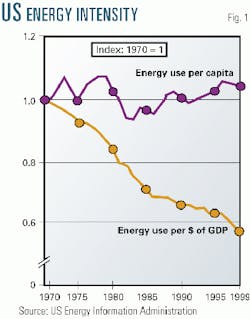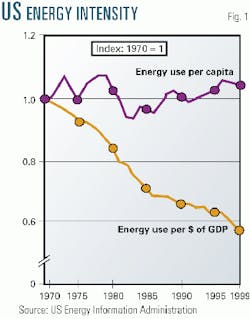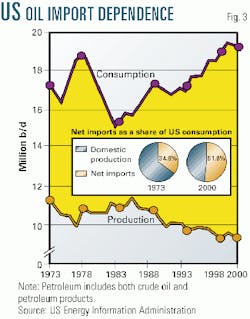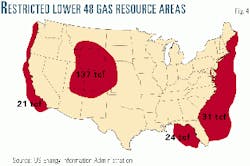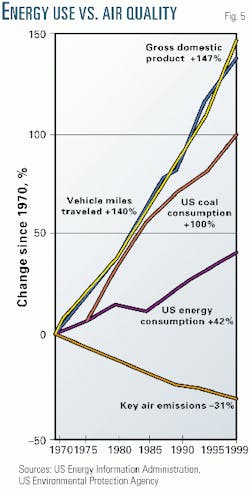Energy policy to dominate US political agenda this year
Contributing to this story were Washington Editor Maureen Lorenzetti, Senior Writer Sam Fletcher, Staff Writer Paula Dittrick, and Executive Editor Bob Williams
The first comprehensive US energy policy plan offered in years will dominate the nation's political agenda this year.
That plan was the brainchild of the administration of President George W. Bush, cobbled together by a task force headed by Vice-Pres. Dick Cheney.
Even ahead of its release on May 17, the energy policy task force report had already come under blistering fire by Democrats and environmental lobbyists.
But oil and gas and other energy industry officials generally found much to praise in the energy plan.
However, a new wrinkle was added last week to the unfolding political drama when the Republicans' tenuous grip on the Senate suddenly appeared in imminent danger of slipping away. Vermont Sen. Jim Jeffords at presstime last week was expected to announce his decision to bolt the GOP and become independent. That could deliver control of the Senate to the Democrats, thus hobbling Bush's agenda.
A change in Senate control could mire any efforts to translate the Bush-Cheney energy plan into legislative action. While the administration will implement some parts of its energy plan goals via executive orders and actions by regulatory agencies, the most-pressing and controversial measures in the plan would have to be introduced as legislation in Congress.
Whatever the plan does accomplish, it will have already served one purpose: to serve as a focal point for debate over a comprehensive US energy policy that has already moved to the forefront of issues now occupying the country's political consciousness. That has not been the case in the US in 2 decades.
And the lines are clearly marked in this debate.
While Democrats and their environmental lobby allies generally favor conservation and renewable energy sources as a solution to the nation's energy woes, Republicans in general and the White House favor efforts to bolster conventional energy supplies with fiscal incentives and regulatory reform.
While the energy task force report cites a need for conservation measures and express concerns over environmental protections, it nevertheless points to substantial progress already made on both scores (Figs. 1 and 5) while raising alarms over US production and imports of oil and gas dwindling as massive dodmestic hydrocarbon resources remain locked up (Figs. 2-4).
Energy plan introduced
Bush cemented industry's expectations that he would seek a friendlier regulatory climate in Washington, DC, when he released the much-anticipated White House energy task force report.
The May 17 document did not disappoint oil lobbyists, although it did cause a political firestorm among environmental groups and their supporters in Congress. White House officials called the report a "blueprint" that Congress could use for energy policy legislation. The report listed 105 recommendations spanning a wide range of energy issues from wellhead to burner tip and light switch (see table, this page). Of those, 73 were directives to federal agencies, many of which federal regulators would have, in theory, considered anyway as part of the normal course of business. Mostly, they urged the departments of Interi- or, Energy, and Commerce to work in concert when crafting energy policies. There also was a strong emphasis on expanding local authority in the area of clean air and natural resource rules.
Congress, meanwhile, was stuck with the real dirty work: only lawmakers can decide whether to approve Bush's recommendation to open the coastal plain of the Arctic National Wildlife Refuge to drilling, for example. Capitol Hill alone has the power to reconsider a contentious batch of electricity proposals that failed to pass in the last Congress. Those include building a nationwide electricity market, giving the federal government authority to site transmission lines, and repealing a 1935 law that restricts mergers of some electric utilities.
The president also asked Congress for $6 billion in new tax incentives over 10 years for conservation and renewable energy programs. In addition, he wants lawmakers to craft a new "multipollutant" strategy to curb power plant emissions.
That's a tall order for Capitol Hill, but Republican leaders say they are up for the challenge, pledging to pass some, if not all, of these energy initiatives this summer. Democrats, however, have indicated that there are wide differences in opinion on what future energy legislation should look like, and it is uncertain what the future holds at this date. House Minority Leader Dick Gephardt (D-Mo.) said on May 17 that the president's plan "makes the wrong choices for the American people," and the report itself "looks like an ExxonMobil annual report, and maybe that's what it is."
Balancing act
But even if Congress fails to pass any of the legislative proposals, there was still a lot for industry to like in the 163-page report. The document generally embraced industry's pleas for less federal involvement in environmental rules and permitting.
Many environmental groups criticized the task force report, saying the White House wanted to "drill its way out" of high energy prices at the expense of environmental protection.
The president, however, maintained his proposal was balanced between increasing energy supplies and encouraging conservation.
"The plan addresses all three key aspects of the energy equation: demand, supply, and the means to match them," Bush said in St. Paul, Minn., when he unveiled his report. "First, it reduces demand by promoting innovation and technology to make us the world leader in efficiency and conservation. Second, it expands and diversifies America's supply of all sources of energy-oil and gas, clean coal, solar, wind, biomass, hydro- power, and other renewables, as well as safe and clean nuclear power. Third and finally, the report outlines the ways to bring producers and consumers together, by modernizing the networks of pipes and wires that link the power plant to the outlet on the wall."
Despite the White House's best efforts, however, most of the attention and controversy over the report stemmed from the president's unspoken endorsement of many (although not all) of the proposals that oil companies offered during last year's presidential election campaign.
The American Petroleum Institute, for example, had told candidate Bush its members wanted at least four elements in an energy policy: greater access to resources on federal lands, onshore and off; an end to unilateral sanctions that ban US companies from operating in some nations; a balanced approach to environmental regulations that considers the nation's energy needs; and expedited permitting for the construction and modernization of refineries, pipelines, and other facilities (OGJ, Sept. 25, 2000, p. 48).
Less than a year later, API looked prophetic. The task force recommendations consistently sought to expand public lands access and streamline permitting.
Most of the recommendations call on regulators to take an interagency approach to resolve energy policy issues. In the past, agencies often had philosophical differences that put them at cross-purposes with each other, stalling action.
Notably absent from the task force report was a call to expand tax incentives for marginal oil and gas production, although the White House has signaled it would support pending bipartisan bills on Capitol Hill.
Industry also was unsuccessful in convincing the administration to remove existing unilateral sanctions against Iran and Libya, although the report did call for an interagency group to "review" sanctions policy.
The White House said it will continue to pursue a "quiet" dialogue with the Organization of Petroleum Exporting Countries but spurned calls for a more active lobbying campaign to boost OPEC supply.
Short-term concerns
The White House said it intends to implement the reeport's recommendations, although it has no timetables.
However, Democrats may force a deadline or two, depending on the support they receive from fellow lawmakers and the mood of the public.
Democratic congressional leaders said they want a special House-Senate committee to investigate high energy prices to see if oil companies are gouging consumers. Democrats also want Congress to create a national consumer energy commission to study recent energy price spikes from a consumer perspective and provide recommendations for legislative action (OGJ Online, May 10, 2001).
The White House is trying to move on the regulatory front. The day after the report was released, the president signed two executive orders. One urged federal agencies to consider energy policy when implementing major rules. Another sought to streamline permits for energy projects on an interagency basis.
Bush said, "The future is achievable, if we make the right choices now. But if we fail to act, this great country could face a darker future, a future that is, unfortunately, being previewed in rising prices at the gas pump and rolling blackouts in the great state of California."
Ironically, Congress may have a hand in delaying some of the administrative ac- tions. Most of the administration's senior policy advisors have yet to be confirmed by the Senate. And many of Bush's recommendations require extensive input by senior staff at agencies.
Congressional sources say that fewer than half of Bush's 500 high-level government picks will be confirmed by Septem- ber, and it is unlikely the administration's team will be fully in place until winter. Nom- inees for jobs may act as advisors but cannot make the key decisions re- quired by many of the task force proposals.
Congressional delays
The situation is equally murky for energy policy recommendations that require legislative action.
Before it became public, Democrats began criticizing the report for not focusing enough on short-term worries, such as higher gasoline prices. And with Congress so closely divided, it will take an unusual amount of parliamentary discipline and compromise to advance legislation. So far, the outlook is not too promising, although it is still early in the congressional session.
Areas of the plan that have bipartisan support include tax incentives for renewable energy, energy efficiency, and gas-electric "hybrid" cars. Independent producers may benefit as well; pending Senate bills by both Republicans and Democrats would expand tax breaks for marginal well production.
Republican leaders continue to insist ANWR leasing could pass Congress under the right set of legislative circumstances. But even White House officials admit that scenario is a long shot.
Yet, pro-ANWR E&D supporters insist political momentum could well shift in their favor, if gasoline prices were to suddenly spike due to a supply disruption in the Middle East. Similar reasoning is offered for other controversial proposals in the task force plan that would require congressional approval.
The task force report does not ask Congress to lift a decades-old moratorium on leasing most federal lands offshore. However, it does call on the secretaries of Commerce and Interior to "reexamine" the legal and policy regime to see if changes are needed.
Most industry lobbyists say expanded offshore drilling outside the Gulf of Mexico and parts of Alaska is a political nonstarter. As a presidential candidate, Bush opposed drilling off California and Florida. His brother, Jeb Bush, the governor of Florida, has opposed the federal government's plan to hold lease Sale 181 in the eastern gulf, although most of the tracts are closer to Alabama than to Florida.
"We're careful never to say never," noted an industry lobbyist. "There could be support for some offshore drilling if we run into $3/gal gasoline this summer."
Overall, Congressional sources and industry lobbyists give 50-50 odds that there will be any kind of meaningful energy policy legislation passed this year.
Still, there is some middle ground and cautious optimism that some proposals may be enacted. These include some noncontroversial items proposed by Jeff Bingaman (D-NM), the Senate Democrats' leader on energy policy issues.
They include streamlining national standards for gasoline in order to ease production and distribution problems, ensuring that refinery production is not curtailed during electricity blackouts, requiring federal vehicles to use more alternative fuels, and urging the maximization of production and distribution of fuels.
The president, however, appears to have crossed the point of no return when it comes to energy policy.
Bush told reporters that the US desperately needs an energy policy. "Interestingly enough, this is the first comprehensive energy policy probably ever-certainly in a long time," he said.
Industry reactions
Oil and gas associations and other groups favoring exploration praised the Bush administration's energy strategy as a balance between boosting domestic supply and encouraging conservation.
API said, "Our nation has not broadly discussed energy for several decades. Energy is critical to our nation's continued economic growth and the improved quality of life it provides for all Americans.
"The US needs additional energy production, as well as increased conservation and energy efficiency, to ensure sufficient supply is available to meet future de- mand."
A Natural Gas Supply Association spokesman said, "The country's energy crisis cannot be treated like a 'spaghetti western': the good, the bad, and the ugly. It's not the 'good guys' versus the 'bad guys,' and it's not clever sound bites that pit one group against another, which is the direction this debate appears to be taking.
"The focus should be on solving the country's energy crisis. The American people are demanding clean, reliable energy at reasonable prices. But real problems exist that are not easy to solve. Demand is outstripping supply in almost every energy sector, which means higher prices for consumers. The president's plan recognizes the need to increase supply in order to balance our current supply and demand scenario."
Jerry Jordan, chairman of the Independent Petroleum Association of America, said, "We are pleased that the president will require all federal agencies to consider the energy impact of new regulations, as well as instituting a streamlining process for issuing permits for energy-related projects. Realistically, natural gas will continue to be a major component in the energy mix. Ensuring natural gas supplies in the face of growing demand is vital to our national interest."
The American Gas Association praised the energy program for proposing to streamline permitting and certification of the 38,000 miles of new gas transmission pipeline needed by 2015.
David Parker, AGA president, said, "As the energy debate moves forward, we hope to see policymakers address the need for an additional 255,000 miles of new distribution pipeline. We can't transport the gas to the city gate and just leave it there."
The Coalition for Affordable and Reliable Energy, which represents companies and associations concerned about energy costs, said, "The administration's plan reflects the reality that it will be impossible to achieve energy security...without more fully relying on coal for a major part of America's energy needs. The US not taking advantage of its abundance of coal would be like Saudi Arabia turning its back on oil."
Alaska Gov. Tony Knowles, chairman of the Interstate Oil and Gas Compact Commission, commended the policy's "commitment to the long-term view of policy, rather than reacting to the short-term price fluctuations."
Roger Herrera spoke for Arctic Power, which was formed to advocate leasing on the ANWR coastal plain. "The president is to be commended for understanding that without oil and gas from ANWR, an energy plan is really no plan at all," he said. "Our economy is increasingly high-tech and electronic. Jobs and quality of life hinge on our having an ample supply of energy. Conservation is certainly important, but if we don't produce more energy, our nation is headed for trouble."
The Renewable Fuels Association noted the energy study cited ethanol as a successful example of renewable and alternative fuels. It applauded the administration's recommending funding for promising ethanol research and supports continuing federal ethanol incentives.
Operating companies respond
The Bush administration's proposed energy policy hit all the right chords among oil and natural gas operating company executives, who appreciate the long-term approach of that plan.
"I like the fact that they recognize there's no quick fix. It will take a comprehensive and long-term plan," said Roger Plank, executive vice-president and CFO of Apache Corp., Houston.
Unlike past policies, the new proposal is more supply-oriented, said Plank, who is also president of the Texas Independent Producers & Royalty Owners Association.
"The US has not had an effective, comprehensive energy policy in decades, and the supply imbalances we're seeing today are largely a result of that," said Robert J. Allison Jr., chairman and CEO of Anadarko Petroleum Corp., Houston, one of the largest independent international oil and gas exploration and production companies. Last year, Anadarko had the most active drilling program in North America.
Bush "has got a good plan, but he can't do it overnight," said Michel T. Halbouty, who headed the energy transition team when President Ronald Reagan and Vice-Pres. George H. Bush first took office in 1981. To produce the amount of additional energy that the US market will require over the next few years, Halbouty said, "Everything has to come together just right. We're going to have to get more rigs, workers, pipelines. It takes time."
Allison said, "We're way behind the demand curve, and it's going to be hard to catch up. It's going to take time, and the long-term approach of the administration's plan is very appropriate."
The administration's proposed energy policy strikes the right balance of in- creased supply and conservation, said Archie W. Dunham, chairman and CEO of Conoco Inc., Houston.
"Clearly, we need to increase domestic supplies of natural gas and oil, remove barriers to improving the nation's energy infrastructure, and make logical use of abundant coal and renewable resources," Dunham said. "Rethinking our attitudes toward nuclear power also makes sense."
However, he said, "Increased supplies must be accompanied by sensible conservation efforts, if we are to solve the problem long-term."
Allison said, "To encourage new production, we need the government to reverse administrative and legislative policies that have put hundreds of millions of acres of resource-rich public lands and waters off limits to drilling, either through moratoria or through measures such as President [Bill] Clinton's 'roadless' designation."
Halbouty, one of the first independents to drill in Alaska, endorsed the proposal to open the ANWR coastal plain for exploration.
The proposed exploration sector on ANWR's coastal plain represents just 8% of the refuge's total area, said Allison.
"The new Alpine field that we developed with Phillips [Petroleum Co.] on the North Slope of Alaska, just 60 miles west of ANWR, demonstrates that oil can be developed safely and responsibly in sensitive arctic environments with very little impact on the environment and no damage," he said. "At the Alpine field, new technology has allowed us to develop the 40,000-acre field from two gravel pads totaling 100 acres."
Allison also supports the proposed Sale 181 in December, "and a regular schedule of sales after that." He called for additional new leasing programs for the East Coast, West Coast, and waters off Alaska.
"We also need to eliminate delays on areas that are open for leasing," said Allison. "We are not trying to take shortcuts on environmental protection. But the approval system has gotten out of hand, and it can take anywhere from 2 to 5 years in some areas to get all the permits we need to drill. This process should be streamlined. New regulations should include rigorous cost-benefit analysis."
Dunham said he is "especially encouraged that the policy recommends a review of unilateral sanctions with an emphasis on US energy security. "Unilateral sanctions are not effective and penalize US companies striving to increase global supplies of oil and natural gas, which ultimately impact the price and availability of energy in the US."
The policy proposal calls for DOE to invest $2 billion during the next 10 years in research of clean coal technology. It also suggests expansion of nuclear energy.
"More nuclear power plants will have to be built. One ton of uranium can produce as much energy as 17,000 tons of coal," Halbouty said. "The president can't get enough additional energy quickly without nuclear plants. But it takes at least 21/2 years to build any kind of plant for generating electricity. It may already be too late."
"We think the real energy crisis occurred during the 1990s, when energy prices fell so low that oil and gas producers weren't earning their cost of capital," Allison said. "We had to slash our drilling budgets to stay afloat, and as a result, today we're living on oil and natural gas discoveries made in the 1970s and 1980s."
Environmental groups respond
Most environmental groups criticized the task force report.
The Wilderness Society said the administration's proposal that drilling be allowed in recently created national monuments and in roadless forest areas in national forests would produce miniscule amounts of oil and gas.
William Meadows, Wilderness Society president, said, "Those who drew up this closed-door energy plan apparently know the price of everything and the value of nothing. We have less than 4% of the world's oil, and even if we poked holes in every scenic place within our borders, it would amount to a blip in the world oil market.
"The proposition that we fund land conservation and research into renewable energy by drilling for oil in the Arctic National Wildlife Refuge makes as much sense as burning your furniture to heat your house. It's perverse logic."
Carl Pope, executive director of the Sierra Club, said, "The energy plan President Bush unveiled won't work, because it makes the wrong choices. We can't drill, dig, and destroy our way to energy independence. Instead, Americans want a balanced approach that gives us quicker, cleaner, cheaper, safer solutions, like energy-efficient technologies; renewable power, like solar and wind; and responsible additions to supply.
"Government geologists estimate the arctic refuge holds only a 6-month supply of oil for the US, and the oil companies know it will take a decade to produce the first drop for consumers. The president pretends the oil industry will use hypodermic needles to extract oil, but surgical precision doesn't exist with oil drilling. Drilling the arctic refuge would take a huge industrial development sprawling across the fragile tundra in a vast web of oil rigs, pipelines, roads, landing strips, housing for workers, and vast incinerators for the waste."
The National Audubon Society said, "The Bush administration's energy policy is a series of misguided proposals that will be destructive for birds, wildlife, and their habitat. By emphasizing supply and production, the policy encourages the destruction of the last wild places in America, places like ANWR."
It added, "Audubon was established nearly 100 years ago. The Bush administration energy policy is almost a century old in its approach. It reflects little in the way of creative policymaking or the use of innovative technology. A national policy based on energy efficiency and new technologies will help Americans keep their lifestyles while letting birds and wildlife live too."
"America must have an energy policy that plans for the future but meets the needs of today. I believe we can develop our natural resources and protect our environment."
